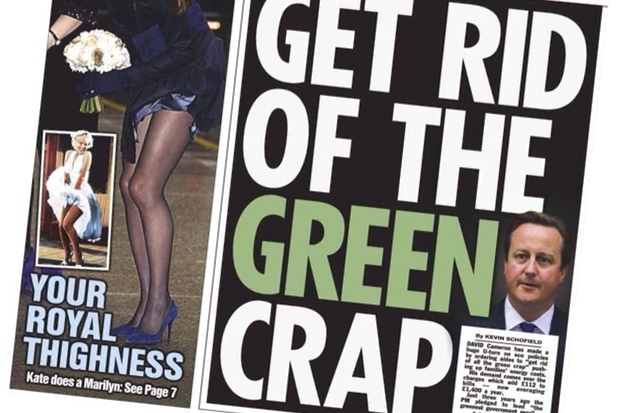The Conservative flirtation with environmentalism was never much more than a branding exercise. Now it is over. Today David Cameron wants to ‘cut the green crap’. Perhaps the Prime Minister has been influenced by David Rose’s cover piece in last week’s Spectator — which encouraged the government to repeal the Climate Change Act, abolish its targets, and stop the Energy Bill coming into force.
Strong stuff. But let’s suppose the government really were to follow Rose’s strategy, what would happen? A shale gas revolution? Don’t bet on it. As the energy company Cuadrilla has admitted, domestic fracking would have an ‘insignificant‘ impact on prices. The US, which has seen prices fall, is currently a closed market. But any UK production would be sold to the highest bidder on the international markets.
That is, of course, if drilling even went ahead. Local protesters up and down the country would, as in Balcombe and Blackpool, oppose hydraulic fracturing and the 1,000 plus trucks of water and chemicals necessary to get a well going.
And whatever happened with fracking, Britain would remain at the mercy of international gas prices, which DECC expects to rise by 16 per cent between now and 2030.
Second, global efforts to tackle climate change would grind to a halt as rapidly growing countries such as China saw that Britain, and therefore Europe, were not serious about their carbon commitments. According to the overwhelming view of the scientific community, this could have catastrophic consequences for the UK including extreme weather, volatile food and commodity prices, as well as bigger demands on British aid from our overseas territories.
Rather than repealing the green levies, Britain should instead press ahead with efforts to increase energy efficiency – the only long-term route to tackling energy bills – and diversify away from fossil fuels. Rose is right (albeit for the wrong reasons) to point out that current policies are not working.
Only 20p in the pound is getting to the target group from the government’s fuel poverty policy (the ‘eco’). We need a new, more targeted approach that relies on real experience instead of dubious proxies. The government’s failing Green Deal should be given rocket boosters by bringing down the cost of loans. This can be done in ‘a cost neutral way’, as a forthcoming IPPR report will show. Serious thought should also be given to scrapping or freezing George Osborne’s unilateral carbon price floor, which is hammering British firms, and instead work in Brussels to improve the Emissions Trading Scheme to provide a level playing field across Europe (something that Tory MEPs recently blocked).
Rose is also right that government renewable subsidies will treble by 2020. But unless we want to be at the mercy of polluting fossil fuels, we have little choice but to pursue a diverse mix of nuclear, renewables and carbon capture technologies. Each of these areas provides an industrial opportunity for new jobs and exports. Low carbon goods and services grew by 3.7 per cent across the world last year. But the coalition has failed to give industry the confidence it needs to invest in the UK. For example, Dong Energy, the Danish company, announced this week that it is investing nearly £2 billion in German offshore wind amid uncertainty over the future of the technology in the UK.
Rose starts his article by detailing the plight of the German chemicals company, BASF. But if BASF was in such a mess, why is the company making record investments in its Ludwigshafen plant or developing special plastics and coatings for wind turbines? If energy intensive industries can innovate to reduce their reliance on energy they can benefit, too. Rather than providing cash handouts, as the Chancellor has done, Britain needs to help our steel, chemicals and cement firms to revolutionise their processes and become more energy efficient. The transition towards a zero carbon economy need not be a zero sum game.
Will Straw is Associate Director for Climate Change, Energy and Transport at the Institute for Public Policy Research.
 The Energy Secretary Ed Davey will be speaking at The Spectator’s ‘How do we stop the lights going out?’ conference on 2 December 2013 in London. Click here for more information.
The Energy Secretary Ed Davey will be speaking at The Spectator’s ‘How do we stop the lights going out?’ conference on 2 December 2013 in London. Click here for more information.






Comments